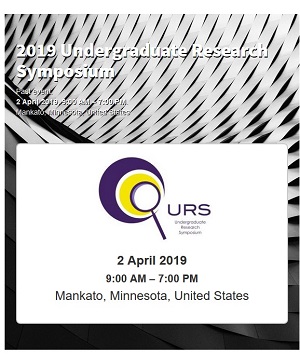Piloting the Cognitive Training Program LEARN for College Student Success
Location
CSU Ballroom
Start Date
2-4-2019 2:00 PM
End Date
2-4-2019 3:30 PM
Student's Major
Psychology
Student's College
Social and Behavioral Sciences
Mentor's Name
Karla Lassonde
Mentor's Department
Psychology
Mentor's College
Social and Behavioral Sciences
Description
Most students who set foot on college campuses across the nation have no formal instruction on learning. Retention and graduation rates from institutional data reveal that, of all the Minnesota State, Mankato students who started in the fall of 2011, 36% transferred to other schools and only 48% of the students graduated in six years. Is it possible that poor learning strategies are partly to blame for these outcomes? A research team of faculty and students have observed this skill deficit first-hand, and they aim to fill this void with the instructional learning program aptly named LEARN. Developed from fundamentals of cognitive psychology, LEARN stands for five crucial knowledge components: L for LISTEN, E for ELABORATE, A for ASSOCIATE, R for RETRIEVAL, and N FOR NIGHT (Lassonde, 2018). Approximately four-hundred and fifty students enrolled in large sections of Introduction to Psychological Science experienced a pilot version of LEARN during two course periods of the semester. Only 10% of these students reported having previous formal training in learning. Findings and the future development of the LEARN METHOD will be discussed.
Piloting the Cognitive Training Program LEARN for College Student Success
CSU Ballroom
Most students who set foot on college campuses across the nation have no formal instruction on learning. Retention and graduation rates from institutional data reveal that, of all the Minnesota State, Mankato students who started in the fall of 2011, 36% transferred to other schools and only 48% of the students graduated in six years. Is it possible that poor learning strategies are partly to blame for these outcomes? A research team of faculty and students have observed this skill deficit first-hand, and they aim to fill this void with the instructional learning program aptly named LEARN. Developed from fundamentals of cognitive psychology, LEARN stands for five crucial knowledge components: L for LISTEN, E for ELABORATE, A for ASSOCIATE, R for RETRIEVAL, and N FOR NIGHT (Lassonde, 2018). Approximately four-hundred and fifty students enrolled in large sections of Introduction to Psychological Science experienced a pilot version of LEARN during two course periods of the semester. Only 10% of these students reported having previous formal training in learning. Findings and the future development of the LEARN METHOD will be discussed.
Recommended Citation
Glende, Madison and Dorothy Nakibirige. "Piloting the Cognitive Training Program LEARN for College Student Success." Undergraduate Research Symposium, Mankato, MN, April 2, 2019.
https://cornerstone.lib.mnsu.edu/urs/2019/poster-session-B/21




